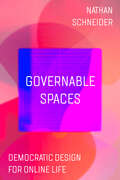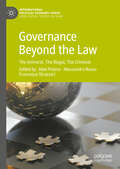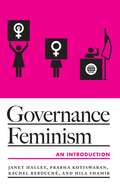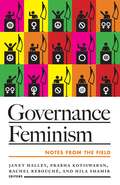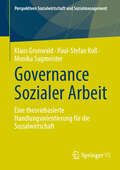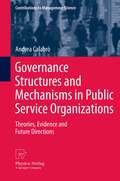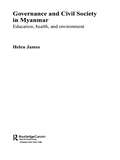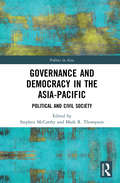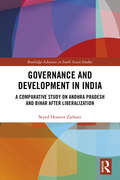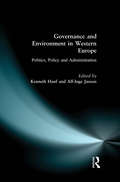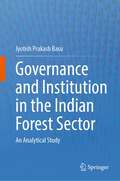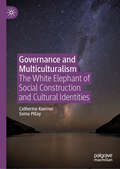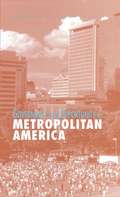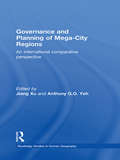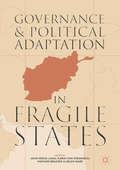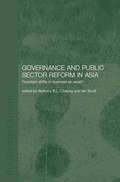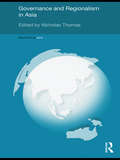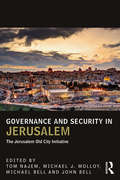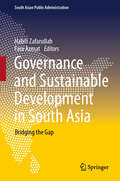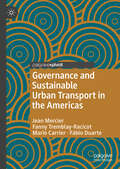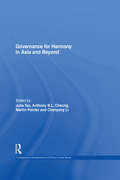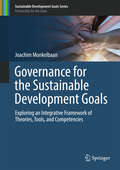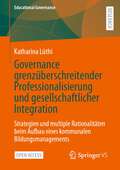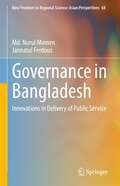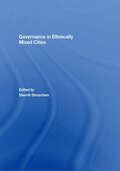- Table View
- List View
Governable Spaces: Democratic Design for Online Life
by Nathan SchneiderA free ebook version of this title is available through Luminos, University of California Press's Open Access publishing program. Visit www.luminosoa.org to learn more. When was the last time you participated in an election for an online group chat or sat on a jury for a dispute about a controversial post? Platforms nudge users to tolerate nearly all-powerful admins, moderators, and "benevolent dictators for life." In Governable Spaces, Nathan Schneider argues that the internet has been plagued by a phenomenon he calls "implicit feudalism": a bias, both cultural and technical, for building communities as fiefdoms. The consequences of this arrangement matter far beyond online spaces themselves, as feudal defaults train us to give up on our communities' democratic potential, inclining us to be more tolerant of autocratic tech CEOs and authoritarian tendencies among politicians. But online spaces could be sites of a creative, radical, and democratic renaissance. Using media archaeology, political theory, and participant observation, Schneider shows how the internet can learn from governance legacies of the past to become a more democratic medium, responsive and inventive unlike anything that has come before.
Governance Beyond the Law: The Immoral, The Illegal, The Criminal (International Political Economy Series)
by Abel Polese Alessandra Russo Francesco StrazzariThis volume explores the continuous line from informal and unrecorded practices all the way up to illegal and criminal practices, performed and reproduced by both individuals and organisations. The authors classify them as alternative, subversive forms of governance performed by marginal (and often invisible) peripheral actors. The volume studies how the informal and the extra-legal unfold transnationally and, in particular, how and why they have been/are being progressively criminalized and integrated into the construction of global and local dangerhoods; how the above-mentioned phenomena are embedded into a post-liberal security order; and whether they shape new states of exception and generate moral panic whose ultimate function is regulatory, disciplinary and one of crafting practices of political ordering.
Governance Feminism: An Introduction
by Janet Halley Prabha Kotiswaran Rachel Rebouché Hila ShamirDescribing and assessing feminist inroads into the state Feminists walk the halls of power. Governance Feminism: An Introduction shows how some feminists and feminist ideas—but by no means all—have entered into state and state-like power in recent years. Being a feminist can qualify you for a job in the United Nations, the World Bank, the International Criminal Court, the local prosecutor&’s office, or the child welfare bureaucracy. Feminists have built institutions and participate in governance.The authors argue that governance feminism is institutionally diverse and globally distributed. It emerges from grassroots activism as well as statutes and treaties, as crime control and as immanent bureaucracy. Conflicts among feminists—global North and South; left, center, and right—emerge as struggles over governance. This volume collects examples from the United States, Israel, India, and from transnational human rights law.Governance feminism poses new challenges for feminists: How shall we assess our successes and failures? What responsibility do we shoulder for the outcomes of our work? For the compromises and strange bedfellows we took on along the way? Can feminism foster a critique of its own successes? This volume offers a pathway to critical engagement with these pressing and significant questions.
Governance Feminism: Notes from the Field
by Janet Halley Prabha Kotiswaran Rachel Rebouché Hila ShamirAn interdisciplinary, multifaceted look at feminist engagements with governance across the global North and global SouthGovernance Feminism: Notes from the Field brings together nineteen chapters from leading feminist scholars and activists to critically describe and assess contemporary feminist engagements with state and state-like power. Gathering examples from North America, South America, Europe, Asia, and the Middle East, it complements and expands on the companion volume Governance Feminism: An Introduction. Its chapters argue that governance feminism (GF) is institutionally diverse and globally distributed—emerging from traditional sites of state power as well as from various forms of governance and operating at the grassroots level, in the private sector, in civil society, and in international relations. The book begins by confronting the key role that crime and punishment play in GFeminist projects. Here, contributors explore the ideological and political conditions under which this branch of GF became so robust and rethink the carceral turn. Other chapters speak to another face of GFeminism: feminists finding, in mundane and seemingly unspectacular bureaucratic tools, leverage to bring about change in policy and governance practices. Several contributions highlight the political, strategic, and ethical challenges that feminists and LGBT activists must negotiate to play on the governmental field. The book concludes with a focus on feminist interventions in postcolonial legal and political orders, looking at new policy spaces opened up by conflict, postconflict, and occupation.Providing a clear, cross-cutting, critical lens through which to map developments in feminist governance around the world, Governance Feminism: Notes from the Field makes sense of the costs and benefits of current feminist realities to reimagine feminist futures. Contributors: Libby Adler, Northeastern U; Aziza Ahmed, Northeastern U; Elizabeth Bernstein, Barnard College; Amy J. Cohen, Ohio State U; Karen Engle, U of Texas at Austin; Jacob Gersen, Harvard U; Leigh Goodmark, U of Maryland; Aeyal Gross, Tel Aviv U; Aya Gruber, U of Colorado, Boulder; Janet Halley, Harvard U; Rema Hammami, Birzeit U, Palestine; Vanja Hamzić, U of London; Isabel Cristina Jaramillo-Sierra; Prabha Kotiswaran, King&’s College London; Maleiha Malik, King&’s College London; Vasuki Nesiah, New York U; Dianne Otto, Melbourne Law School; Helen Reece; Darren Rosenblum, Pace U; Jeannie Suk Gersen, Harvard U; Mariana Valverde, U of Toronto.
Governance Sozialer Arbeit: Eine theoriebasierte Handlungsorientierung für die Sozialwirtschaft (Perspektiven Sozialwirtschaft und Sozialmanagement)
by Klaus Grunwald Monika Sagmeister Paul-Stefan RoßDer vorliegende Band widmet sich der Steuerung von sozialwirtschaftlichen Organisationen und von Unterstützungsarrangements der Sozialen Arbeit. Der Governance-Ansatz wird genutzt, um auf zentrale Steuerungsfragen Sozialer Arbeit konzeptionelle Antworten zu finden, die vor dem Hintergrund der gegenwärtigen gesellschaftlichen Transformationsprozesse tragfähig sind. Dazu greift er auf die Diskurse zu Welfaremix, Netzwerken sowie Organisationen und ihrer Steuerung zurück. Ziel ist eine theoretisch-konzeptionelle Fundierung der Handlungspraxis von (potenziellen) Führungskräften in der Sozialen Arbeit.
Governance Structures and Mechanisms in Public Service Organizations: Theories, Evidence and Future Directions
by Andrea CalabròThis book addresses the nexus of issues exploring governance structures and mechanisms in public service organizations, thus contributing to the development of disciplines that focus on public management. It goes beyond the state of the art by addressing a number of specific issues in a more systematic fashion. The book's interdisciplinary focus is a particularly valuable asset, as its topic is situated at the crossroads of a number of fields, including public management, business administration, corporate governance, policy studies, political science, sociology, and third sector studies, all of which offer important perspectives and are important for the development of public management and public services. The book covers more than Italy and Norway and focuses specifically on public service organizations, addressing more aspects of their governance structures and mechanisms than any other book available today. The unique presentation of features related to the governance and management of different actors (state-owned enterprises, local public utilities, ministries, municipalities, citizens, etc.), involved at different levels in the production and provision of public services, makes it possible to compare and contrast these different perspectives and opens new avenues of theoretical collaboration and development.
Governance and Civil Society in Myanmar: Education, Health and Environment (Routledge Contemporary Southeast Asia Series #Vol. 3)
by Helen JamesMost international attention on Myanmar has focused on the political situation, where the military, in power since 1962, continues to refuse to acknowledge the results of democratic elections, and on related human rights issues. This book, by focusing on education, health and environment, and on the institutions which formulate and deliver policy in these fields, shows how the international community can make a significant difference to strengthening Myanmar's civil society and to supporting a future democratic form of government, by encouraging institutional developments in these fields. Such developments in turn, the author argues, will re-skill the younger generation, promote economic development and poverty alleviation, and, through a participatory approach to policy-making, nurture the conditions from which democracy will grow.
Governance and Democracy in the Asia-Pacific: Political and Civil Society (Politics in Asia)
by Mark R. Thompson Stephen McCarthyThis book explores the theoretical and empirical relationship between democracy and governance in the Asia-Pacific region. Examining a variety of country cases and themes addressing the theoretical tension between governance and democracy, it illuminates how this impacts political and civil societies across the region. Analysing the character, structure and current trajectories of polities in the Asia-Pacific, democratic or otherwise, this book demonstrates that the role of civil society, political society and governance has significantly differed in practice from what has been commonly assumed within the international community. The book includes both theoretical investigations tracing the modern development of the concepts of governance, development and democratization as well as regional and country-specific observations of major issues, presenting comprehensive country-level studies of China, Singapore, Thailand, Cambodia, the Philippines, Myanmar, Fiji and the Solomon Islands. Presenting fascinating insight into non-democratic governance, civil society and the rule of law in illiberal contexts, Governance and Democracy in the Asia-Pacific will prove to be of great use to students and scholars of Asian politics and society, as well as international and comparative politics.
Governance and Development in India: A Comparative Study on Andhra Pradesh and Bihar after Liberalization (Routledge Advances in South Asian Studies)
by Seyed Hossein ZarhaniThe study of the political economy of development in India is significant as India has emerged as one of the fastest-growing countries during the last three decades and the rate of economic growth and poverty reduction have not been matched in India’s subnational states. Although the Union Government has introduced and implemented several economic reforms since 1991 to enhance the economic development, the results of implantation have varied. Governance and Development in India compares two Indian subnational states, Andhra Pradesh and Bihar. The book does not consider the state as an aggregate entity; rather, it disaggregates the state relationally and spatially. Concentrating on the micro-institutional variables and the role of regional elites, the author investigates the political roots of the divergence of development trajectories among India’s subnational states since liberalization, as an essential aspect of the political economy of development in India. The book explores the black box of the multi-layered state of India and interactions among the Central Government, the states, regional leaders and other stakeholders and explains why the regional leaders have pursued divergent economic strategies using the analytical narrative research method and the subnational comparative research method. Firmly based on the theoretical foundations of the neo-institutional rational choice model of governance, polycentric hierarchy theory and the strategies for regional elite strategy analysis, combined with empirical research, this book is a valuable contribution to the fields of comparative political economy, state politics in India, governance and development in developing countries, and South Asian comparative politics.
Governance and Environment in Western Europe: Politics, Policy and Administration
by Kenneth Hanf Alf-Inge JansenGovernance and Environment in Western Europe: Politics, Policy and Administration, provides an up-to-date overview of developments in this area focusing on a selection of ten countries in Western Europe and the European Union. The countries examined are: Denmark, France, Germany, Greece, Italy, The Netherlands, Norway, Spain, Sweden and the United Kingdom. The range of countries covered - representing as they do different stages of development in environmental policy, different state and institutional traditions - provides an interesting comparative analysis of how different countries confronting similar problems of environmental management have responded politically and (re)organised their administrative systems for implementing these policies.
Governance and Institution in the Indian Forest Sector: An Analytical Study
by Jyotish Prakash BasuThis book addresses quantitative assessment of forest governance and how local-level institutions work in governing efficient ways of forest resource management so that sustainable development of forest is ensured. The research is done at the micro-level as well as macro-level in India. The research presented here focuses on forest governance and institutions in the two forest divisions of West Bengal say South Bengal and North Bengal. The research covers 36 villages, 844 households, 10 Gram panchayat, 12 Beat offices, and 36 Forest protection Committees in West Bengal and also studies different local-level institutions like local communities/households; Joint Forest Management Committees (JFMC)/Forest Protection Committees (FPCs); Community Forest Management groups; Van Panchayats; Village Councils (schedule VI area) and Biodiversity Management Committees; Eco-development committees, NGOs and Self-Help Groups, and Panchayati Raj Institutions (PRIs). Chapters also address various issues like monitoring, enforcement, rule of law, transparency, accountability, participation, control of corruption, government effectiveness, regulatory quality, and sustainable livelihood in connection with the study of forest governance. This research is associated with different sectors like agricultural sector, forestry sector, informal sectors and rural development, etc., and involved multi-stakeholders. Particular attention is given on the policy-oriented research which is the cornerstone of SDG of 16. Developmental practitioners, government implementation agencies, researchers in environmental science and social science, and policymakers find this book appealing.
Governance and Multiculturalism: The White Elephant of Social Construction and Cultural Identities
by Soma Pillay Catherine KoernerA key intervention in the growing critical literature on race, this volume examines the social construction of race in contemporary Australia through the lenses of Indigenous sovereignty, nationhood, and whiteness. Informed by insights from white Australians in rural contexts, Koerner and Pillay attempt to answer how race shapes those who identify as white Australian; how those who self-identify thusly relate to the nation, multiculturalism, and Indigenous Sovereignties; and how white Australians understand and experience their own racialized position and its privilege. This “insider perspective” on the continuing construction of whiteness in Australia is analyzed and challenged through Indigenous Sovereign theoretical standpoints and voices. Ultimately, this investigation of the social construction of race not only extends conceptualizations of multiculturalism, but also informs governance policy in the light of changing national identity.
Governance and Opportunity in Metropolitan America
by National Research CouncilAmerica's cities have symbolized the nation's prosperity, dynamism, and innovation. Even with the trend toward suburbanization, many central cities attract substantial new investment and employment. Within this profile of health, however, many urban areas are beset by problems of economic disparity, physical deterioration, and social distress.This volume addresses the condition of the city from the perspective of the larger metropolitan region. It offers important, thought-provoking perspectives on the structure of metropolitan-level decisionmaking, the disadvantages faced by cities and city residents, and expanding economic opportunity to all residents in a metropolitan area. The book provides data, real-world examples, and analyses in key areas: Distribution of metropolitan populations and what this means for city dwellers, suburbanites, whites, and minorities.How quality of life depends on the spatial structure of a community and how problems are based on inequalities in spatialopportunity--with a focus on the relationship between taxes and services.The role of the central city today, the rationale for revitalizing central cities, and city-suburban interdependence. The book includes papers that provide in-depth examinations of zoning policy in relation to patterns of suburban development; regionalism in transportation and air quality; the geography of economic and social opportunity; social stratification in metropolitan areas; and fiscal and service disparities within metropolitan areas.
Governance and Planning of Mega-City Regions: An International Comparative Perspective (Routledge Studies in Human Geography)
by Jiang XuNeoliberalism’s market revolution has had a tremendous effect on contemporary mega-city regions. The negative consequences of market-oriented politics for territorial growth have been recognized. While a lot of attention has been given to how planners and policy makers are fighting back political fragmentation through innovative governance and planning, little has been done to reveal such practices through an international comparative perspective. Governance and Planning of Mega-City Regions provides a comparative treatment and examination of how new approaches in governance and planning are reshaping mega-city regions around the world. The contributors highlight how European mega-city regions are evolving and how strategic intervention is being redefined to enable the integration of urban qualities in a multi-level governance environment; how traditional federal countries in North America and Australia see the promise of major policies and development initiatives finally moving ahead to herald a more strategic intervention at national and regional scales; and how transitional economies in China witness the rise of state strategies to control the articulation of scales and to reassert the functional importance of state in a growing diffused power context. This book offers case studies written from a variety of theoretical and political perspectives by world leading scholars. It will appeal to upper level undergraduates, postgraduates, researchers, and policymakers interested in urban and regional planning, geography, sociology, public administrations and development studies.
Governance and Political Adaptation in Fragile States
by Helen Ware John Idriss Lahai Karin Von Strokirch Howard BrastedThe book examines the various ways that fragile states (or states with limited statehood) in Africa, Asia, the Pacific, and the Americas have adopted, and adapted to, the processes of liberal political governance in their quests to address the problem of political fragility. It presents the stories of resilience in the political adaptation to Western liberal conceptions of governance. In addition to singular or comparative country case studies, this project also examines the interplay of culture, identities, and politics in the creation of people-centric governance reforms. Towards these ends, this volume sheds light on weak states’ often constructive engagement in the promotion of state governance with a variety of political conditions, adverse or otherwise; and their ability to remain resilient despite the complex political, sociocultural, and economic challenges affecting them. Through a multidisciplinary approach, the authors aim to counter the noticeable shortcomings in the discursive representations of fragility, and to contribute a more balanced examination of the narratives about and impact of political adaption and governance in people’s lives and experiences.
Governance and Public Sector Reform in Asia: Paradigm Shift or Business as Usual?
by Ian Scott Anthony B. L. CheungBased on new field research, this book assesses the current state of governance and public sector reforms in eleven Asian countries and jurisdictions, especially in the wake of the recent regional financial crisis that seriously affected some of them. It analyses reform efforts comparatively against a backdrop of governance problems, and seeks to establish whether these efforts represent a substantive shift in attitudes towards reform or whether they serve simply to reinforce existing practices. The authors explore a number of important themes that are central to governance and public sector reform issues. These include the role of the state, the success or failure of organizational reforms, corruption, the applicability of the new public management model in the Asian context, and the governance values and reform models promoted by regional and international agencies.
Governance and Regionalism in Asia (Politics in Asia)
by Nicholas ThomasIn the decade since the Asian financial crisis the ten states of Southeast Asia that form ASEAN, together with China, Japan and South Korea have formed the basis of a community intended to support the well-being of its member states, markets and peoples. This highly successful regionalisation was not anticipated by the region’s leaders, however, and as a result, policy makers are increasingly talking about ‘meeting fatigue’ and the need to find a better way to govern regional affairs. Among the reforms being considered is a shift towards a more rules-based culture as well as the more explicit incorporation of both private sector and civil society organisations into the policy processes. In short, ASEAN+3 is seeking to develop new norms and processes for its networks and institutions. This book explores the pressures currently influencing East Asian regionalist policy debates, analysing the trend towards deeper integration and the emergence of a governance model for managing regional processes. Combining state and subnational perspectives in conjunction with an examination of the role of the business community and civil society organisations, this book highlights the policy challenges confronting regionalism and governance in East Asia, including key issues such as the rule of law, financial cooperation and a case study on disaster management.
Governance and Security in Jerusalem: The Jerusalem Old City Initiative (UCLA Center for Middle East Development (CMED) series)
by Michael Bell John Bell Tom Najem Michael J. MolloyGovernance and Security in Jerusalem is the second in a series of three books which collectively present in detail the work of the Jerusalem Old City Initiative, or JOCI, a major Canadian-led Track Two diplomatic effort, undertaken between 2003 and 2014. The aim of the Initiative was to find sustainable governance solutions for the Old City of Jerusalem, arguably the most sensitive and intractable of the final status issues dividing Palestinians and Israelis. This book presents a collection of studies commissioned by the Initiative in aid of its work on the Special Regime. It is split into three parts, Part I provides background papers on governance and security issues; Part II presents Palestinian and Israeli partner perspectives on governance options for a special regime, and the Part III delivers partner perspectives on security studies for a special regime. The studies written by the Israeli and Palestinian partners provide important background and historical context for JOCI's work on security and governance. The position papers, presented in their original form, greatly influenced the development of the Special Regime governance model. Offering a unique insight on a range of governance and security issues in Jerusalem, this book will be of great significance to the policy-making community and students and scholars with an interest in Middle East politics, the Israeli-Palestinian conflict and the Middle East peace process.
Governance and Sustainable Development in South Asia: Bridging the Gap (South Asian Public Administration)
by Habib Zafarullah Fara AzmatThis edited volume analyzes South Asian public administration and its role in development through the lens of SDG 16. Chapters explore how SDG 16 has influenced the development of effective and accountable public institutions and the initiatives taken within this region to promote an inclusive society, provide access to justice for all, and build effective, accountable, and inclusive institutions at all levels. Each case presented offers best practices, the challenges faced, and the opportunities SDG 16 provides for regional and national development, as well as valuable insights into the transfer of knowledge and learning within the South Asian region and for broader “South-South” and “South-North” exchange. The book is intended for policymakers, businesses, civil society organizations as well as academics across research fields spanning management, social innovation, and corporate sustainability, who are pursuing research on public administration, governance and the SDG Agenda.
Governance and Sustainable Urban Transport in the Americas
by Jean Mercier Fanny Tremblay-Racicot Mario Carrier Fábio DuarteThis volume explores the governance patterns of three cities of the Americas, Seattle, Montreal, and Curitiba, which all present different but interesting cases in dealing with sustainable urban transport challenges. The authors study empirical data from these three cities to analyze how specific governmental and policy instruments (planning, consultation and market mechanisms for example) were implemented in each case. Through concepts coming from policy studies and sociology, for example, such as path dependency, institutional culture and transaction costs, the three cities are also looked at in a broader perspective in order to better understand how they deal differently with their common challenges.
Governance for Harmony in Asia and Beyond (Comparative Development and Policy in Asia)
by Chenyang Li Anthony B. Cheung Julia Tao Martin PainterHarmony has become a major challenge for modern governance in the twenty-first century because of the multi-religious, multi-racial and multi-ethnic character of our increasingly globalized societies. Governments all over the world are facing growing pressure to integrate the many diverse elements and subcultures which make up modern pluralistic societies. This book examines the idea of harmony, and its place in politics and governance, both in theory and practice, in Asia, the West and elsewhere. It explores and analyses the meanings, mechanisms, dimensions and methodologies of harmony as a normative political ideal in both Western and Asian philosophical traditions. The book argues that in Western political thought - which sees politics as primarily concerned with resolving social conflicts and protecting individual rights - the concept of harmony has often been neglected. In contrast, since earliest times harmony or 'he' has been a profound theme in Confucian thought, and current leaders of many East Asian governments, and the Chinese government, have explicitly declared that the realisation of a harmonious society is their aim. The book also assesses how harmony is pursued, jeopardized or deformed in the real world of politics, based upon empirical analysis of a variety of different cultural, social and political contexts, including: China, Hong Kong, Singapore, Malaysia, Singapore, Vietnam, Denmark, Latin America and the Scandinavian countries. It shows how harmony as an organizing concept can help to promote new thinking in governance, and overcome problems of modern-day governance like distrust, adversarial conflicts, hyper-individualism, coercive state intervention, and free-market alienation. It also discusses the potential problems posed by the pursuit of harmony, in particular in the grave threat of totalitarianism, and considers how these risks could best be mitigated.
Governance for the Sustainable Development Goals: Exploring An Integrative Framework Of Theories, Tools, And Competencies (Sustainable Development Goals Series)
by Joachim MonkelbaanThis book provides a detailed overview of governance for the Sustainable Development Goals (SDGs). Adopting a unique integrative approach, it examines the fragmentation of governance that is a critical barrier to achieving the SDGs. The main question addressed is: What are the crucial elements and the organizing logic of an integrative framework that is suitable for analysing governance for the SDGs and for implementing the transitions that we need towards a more sustainable world?This transdisciplinary book first proposes a combination of innovative governance theories that can improve the analysis and practice of sustainability governance. Secondly, it explores the interests of core actors in a number of case examples. And thirdly, it offers recommendations for improving the study and practice of sustainability governance.The findings presented form the basis for a new approach to governance towards objectives such as the SDGs: Integrative Sustainability Governance (ISG). The ensuing ISG framework includes indicator frames within the pillars of power, knowledge and norms. The book concludes that the transformation of crisis into sustainability transitions requires a deeper consideration of risk management that strengthens resilience; systems deliberation that complements democracy; and behavioral insights that elevate human awareness and collaboration. This handbook is a comprehensive and valuable companion for students, experts and practitioners with an interest in the SDGs.
Governance grenzüberschreitender Professionalisierung und gesellschaftlicher Integration: Strategien und multiple Rationalitäten beim Aufbau eines kommunalen Bildungsmanagements (Educational Governance #57)
by Katharina LüthiIn diesem Open-Access-Buch wird den Fragen nachgegangen, wie der Akteur Kommunales Bildungsmanagement kollektive Handlungsfähigkeit herstellt und welchen Beitrag diese Koordinationsarbeit zur gesellschaftlichen Integration leistet. Die Rekonstruktion von Arenen, die in einem komplexen Geflecht von Integrationsräumen zusammenwirken, basiert auf Interviewdaten der wissenschaftlichen Begleitforschung zum Programm Lernen vor Ort. Ausgehend von dem Verständnis eines Theorie-Methodenpakets zwischen der interaktionistischen Handlungstheorie und der Grounded-Theory-Methodologie werden zentrale Herausforderungen der Governance-Forschung mithilfe der Zeigestruktur der Erziehung zu einer prozessbezogenen pädagogischen Organisationsforschung zusammengeführt.Dies ist ein Open-Access-Buch.
Governance in Bangladesh: Innovations in Delivery of Public Service (New Frontiers in Regional Science: Asian Perspectives #68)
by Md. Nurul Momen Jannatul FerdousThis book adopts the multidimensional nature of innovation as its point of focus and offers a comprehensive analysis of contemporary governance issues in Bangladesh. Each chapter views those issues from its own disciplinary perspective, but all share a common focus on the current process in the governance of innovation. The authors show how the processes of innovation and public service delivery are influenced while there is simultaneously a striving for a digital Bangladesh. The book presents innovation as a complex phenomenon with multidisciplinary viewpoints affecting its governance. As well, new practices, developments, and empirical research are shown here. The aim is to point out the most persistent difficulties in public administration and public service delivery, with an emphasis on how to deliver public service in Bangladesh in a sustainable manner. Although significant transformations have been made recently for a better organized public sphere, public services still must be more closely in line with what citizens need rather than what service providers are prepared to deliver. This published work speaks strongly to a wide-ranging audience, from scholars of governance and innovation management to academics, researchers, and postgraduate students interested in public service delivery innovations in Bangladesh and South Asia. Indeed, the book serves as a text and valuable resource for postgraduate courses in politics, business administration, economics, political science, development, and governance in South Asia.
Governance in Ethnically Mixed Cities (ISSN)
by Sherrill StroscheinThis collection of original essays breaks new ground by examining the dynamics of ethnic politics at the local level, rather than following in the footsteps of many previous studies which focus on the macropolitical level of states and nations. Governance in Ethnically Mixed Cities is based on extensive fieldwork and local observation, providing perspectives from a range of academic disciplines including Political Science, Geography, and Anthropology. It covers a variety of geographic areas from the Middle East (Kirkuk, Haifa, and Tel Aviv-Jaffa) to Europe (Mostar, Bolzano, Toulouse, and Florence), Central Asia (Osh in Kyrgyzstan) and the United States (Durham, North Carolina). In spite of the variety of disciplinary approaches and geographic diversity of the case studies, the contributing authors uncover a number of common elements of local ethnopolitical dynamics in mixed cities: the power of informal institutions, the effect of numerical balances between groups on local politics, and the significance of local competition for material and symbolic resources. Each of these areas provides a promising avenue for future research.
